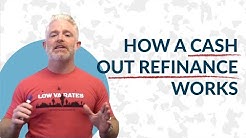Contents
Standard Cash-out Refinance: Limited Cash-out Refinance: LTV of 80% for primary residence or 75% for second/vacation home: LTV of 95.01 to 97%: Amount of cash the borrower can receive is limited only by the home’s equity and ltv requirements: amount of cash the borrower can receive is limited to the lesser of 2% of the new loan amount or $2,000.
Texas Cash Out Laws Texas Cash-out Refinances. When you do a cash-out refinance in Texas, you can borrow up to 80% of your home’s fair market value. For example, a home valued at $100,000 will result in a maximum loan amount allowed of $80,000.
The VA Cash-Out refinance loan replaces your existing mortgage instead of complementing it. The process for obtaining a Cash-Out refinance looks similar to the process for getting a VA purchase loan, from credit benchmarks and underwriting to the VA appraisal and more. This refinance is the only way for VA homeowners to extract cash from equity.
Thinking of cashing out some equity when you refinance your mortgage. you might be able to cut your LTV ratio to 75 percent or less, get a more favorable interest rate and avoid mortgage insurance.
Cash Out Refinance Investment Property Ltv PURCHASE AND "NO CASH-OUT" REFINANCE MORTGAGES** (Fixed-Rate and ARMs) ** See chart below for LTV/TLTV/HTLTV ratios and other requirements for a "no cash-out" refinance of a mortgage currently owned or securitized by Freddie Mac.
 With a cash-out refinance you would remortgage your home for $160,000, and at closing you would receive a lump sum payout of $60,000. Unlike a second mortgage or a home equity line of credit, this is cash money in your hand, payable when your new mortgage is approved and finalized.
With a cash-out refinance you would remortgage your home for $160,000, and at closing you would receive a lump sum payout of $60,000. Unlike a second mortgage or a home equity line of credit, this is cash money in your hand, payable when your new mortgage is approved and finalized.
Purchase & Cash-Out Refinance Home Loans. With a Purchase Loan, VA can help you purchase a home at a competitive interest rate, and if you have found it difficult to find other financing.. VA’s Cash-Out Refinance Loan is for homeowners who want to take cash out of your home equity to take care of concerns like paying off debt, funding school, or making home improvements.
The more equity you have, the more money you may be able to get from a cash-out refinance. Many homeowners take cash out to pay off high-interest debt or make home improvements. Try our refinance calculator to see if you have enough equity to reach your financial goal.
While the interest rates on a cash-out refinance are usually lower than those on a home equity loan, they can become expensive once additional loan level pricing adjustments are considered. Depending.
Cash Out Home Equity Cash Out Refinance Rates Cash Out refinancing calculator home refinance Cash Out If you’re interested in borrowing against your home’s available equity, you have choices. One option would be to refinance and get cash out. Another option would be to take out a home equity line of credit (HELOC). Here are some of the key differences between a cash-out refinance and a home.A cash-out refinance allows a homeowner to tap into their home equity by borrowing more than what they owe and is a common choice. Of the 483,000 refinances in the fourth quarter of 2018, some 82.Smart Refinance is a fixed-rate loan with terms of up to 20 years. It is not a line of credit.See if you are eligible for a cash-out refinance to get money out of your home's equity to use for a variety of purposes.Cash Out Refinancing Calculator Does it make sense to refinance? Deciding if it makes sense to refinance starts with this question: What are your financial goals? Whether you want to lower your monthly payment, get a lower interest rate, shorten your term or do a cash-out refinance, our refinance calculator can help you determine if refinancing can help you meet your goals.
LTV is the ratio of your current mortgage balance compared to the market value of your home, as determined by appraisal. Mortgage lenders usually allow cash out up to 80% of the property value, but FHA allows 85% and the VA allows 100%. When refinancing to access cash, your loan may not exceed a maximum loan-to-value ratio.